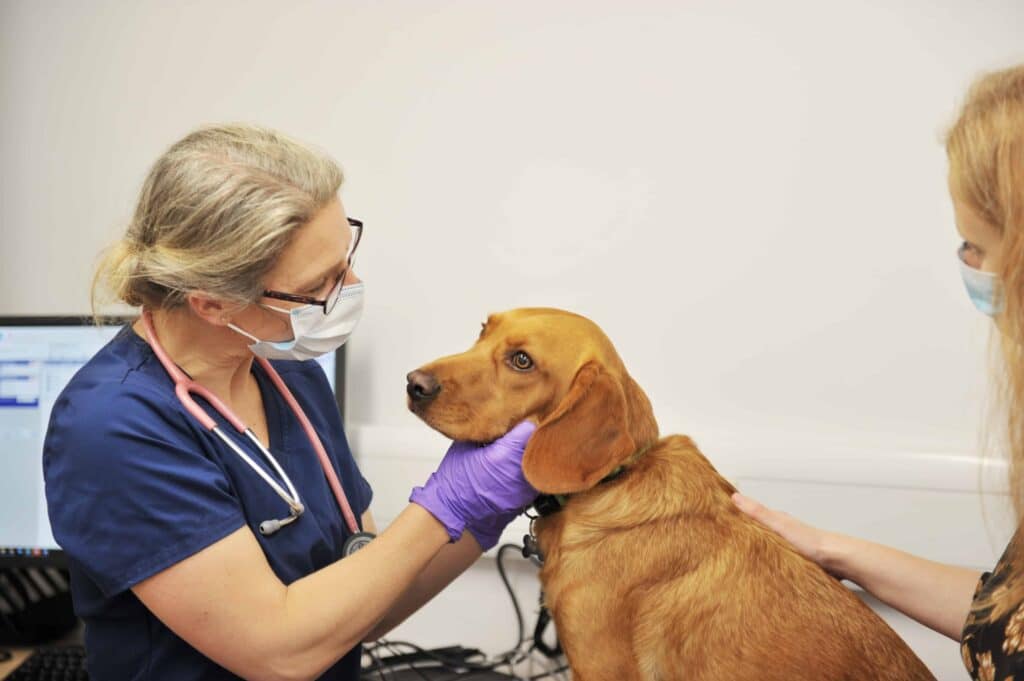10 early warning signs of cancer in our pets
15 November 2022 / Oncology
Identifying early signs of possible cancer in your pets in Runcorn and getting a quick diagnosis can help to save the lives of our pets. Here we provide some information on things you can look out for:
1 Lumps and bumps on or under the skin
Regularly run your hands gently across your pet’s skin, feeling for any lumps or bumps on or under the skin. Although such lumps may be due to an abscess, cyst or insect bite they could also be a sign of skin cancer or enlargement of the glands (lymph nodes). Unfortunately, just to the touch, you can’t tell if a lump is cancerous or not and so any lump should be tested by a vet. This usually involves placing a small needle into the lump to get a sample of cells which can then be examined under the microscope.
2 Abnormal odours
Any unusual smell coming from sites such as your pet’s mouth, ears or anus? Although smells are often due to infection these can also be a sign of cancer. Bad breath is most commonly due to dental disease but can also be a sign of oral cancer and so a thorough oral examination should be performed by your vet
3 Persistent sneezing or runny nose
Persistent sneezing, snotty discharge or bleeding from one or both nostrils can be a sign of nasal cancer. These signs are often attributed to an infection or allergy, rather than potential cancer symptoms, which can lead to a delay in diagnosis and the cancer being extensive by the time it is diagnosed. One simple test a vet can do is to assess airflow through the nostrils using a piece of cotton wool placed at each nostril when the animal is breathing. Tumours are more likely to cause an obstruction of airflow due to the presence of a mass in the nasal cavity.
4 Loss of appetite or weight loss
A loss of appetite or rapid weight loss are signs that something isn’t quite right with your pet. These are very non-specific signs and can be caused by many different issues such as dental disease, gastrointestinal, metabolic or hormonal issues but could also indicate cancer. In such cases blood work and urinalysis is usually advised initially followed by imaging.
5 Coughing or difficulties breathing
If your pet has a persistent cough or changes in how they are breathing (increased breathing rate or more effort when breathing) then further investigations are advised. Such signs can be caused by heart issues as well as issues within the chest. Initial investigations would involve the vet having a good listen to the chest with a stethoscope to detect any changes such as a heart murmur or increased or decreased lung sounds. Further investigations with us at North West Specialists may involve heart scans (echocardiography), imaging of the lungs (X-rays or CT) and bronchoscopy (camera which enables us to look down the airways).
6 Increased drinking or urinating
Increased drinking or urinating can be a sign of cancer as well as other metabolic and hormonal conditions (such as diabetes). Some types of tumour can cause an increase in calcium levels in the blood which can lead to pets suddenly drinking and urinating more. If you noticed your pet drinking more and /or waking you up in the night to urinate then you should contact your vets. Initial tests will usually involve blood tests and urinalysis. It can be helpful to accurately measure how much your pet is drinking in 24 hours so you can let your vet know.
7 Non-healing wounds or sores
Persistent non-healing wounds or sores can be a sign of an infection but can also be due to cancer. For example a nail infection which does not heal can be a sign of cancer involving the nail bed. Any non-healing sores should be assessed by your vet and samples taken.
8 Change in toileting habits
If your pet starts to urinate more frequently or has an altered urine stream or if your pet starts to strain to pass faeces or these are more narrowed in appearance, then this could be a sign of an infection or inflammation but also cancer. If you note any such changes in toileting habits or any blood in the urine or faeces then further investigations to find the cause should be performed. This may involve tests such as urinalysis, a rectal examination and imaging of the abdomen.
9 Evidence of pain
Limping or other signs of pain are often due to arthritis or muscular injury, however some cancers, in particular bone cancer can cause the same symptoms. Patients showing persistent signs of discomfort should be fully assessed by a vet and imaging (eg X-rays or CT) may be advised to determine the cause and ensure that the patient receives the optimal pain relief to keep them comfortable.
10 Lower energy levels or change in behaviour
If your dog starts to seem less keen on going on their walks or your cat seems to become a lot quieter and taking themselves away from things, then this is a sign that something is wrong. These signs are very non-specific and could indicate many things such as heart issues, metabolic changes, and arthritis but could also be due to cancer. Owners know their pets and if you think something just doesn’t seem quite right, however subtle, then your pet should be checked by a vet.
These signs can be caused by many different and often treatable conditions, many of which aren’t cancer. However the key thing is that if you have any concerns, to have your pet checked by a vet to allow a quick diagnosis. This will enable your pet to receive the optimal treatment with us at North West Specialists sooner and offer a better outcome.




